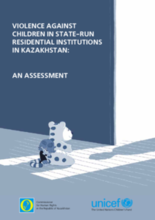This study on violence against children in state-run residential institutions in Kazakhstan was conducted under the national Office of the Commissioner for Human Rights and UNICEF. Data was collected from six different types of state run- residential institutions for children (total of 30) from 3 regions. The institutions included infant homes, institutions for children with psycho-neurological and severe disabilities, special correctional institution of education, orphanages, shelters, specialized institutions for the education of children with deviant behavior and one youth house, run under 3 different Ministries.
The research used a multi-methods approach that included surveys with children (9-18 years old) and staffs, and interviews with young people (17- 23 years old) who had left the care of these institutions and were living in state- run youth homes. The study focused on five types of violence- bullying, harsh verbal abuse, psychological abuse, and physical abuse - and four different types of neglect - nutrition, clothing, medical, and supervision. The findings reveal that violence in these institutions, among children and by staff, is a serious problem. Nearly 43% of children in shelters and 50% of children in orphanages and institutions for children with deviant behavior reported witnessing violence among children. In addition, 26% of children in shelters, 35% in orphanages and 41% in institutions for children with deviant behavior reported witnessing staff use violence against children, while 22% of staff in infant homes, 51% of staff in institutions for children with psycho-neurological and severe disabilities, and 56% of staff in special correctional institutions of education reported that they witnessed staff use of violence against children in these institutions.
Interviews with young people who have left these institutions depict an even starker reality of violence, with reports of psychological and physical abuse as common, and the use of practices such as being locked up in small rooms or meat refrigerators in isolation for prolonged periods of time, or being sent to psychiatric hospitals as a form of punishment for a range of reasons, including non-compliance and fighting. The study also revealed low levels of trainings for staff on identifying and reporting violence against children, pervasive lack of knowledge about code of conduct and disciplinary procedures to respond to the violence, and high level of support among staff about the use of corporal punishment (25% to 30%). The report contains wide ranging recommendations on the prevention, reporting and monitoring of violence and the prevention of institutionalization, including through the development of alternative systems of family based care and community based services.
©Commissioner for Human Rights in the Republic of Kazakhstan and UNICEF

